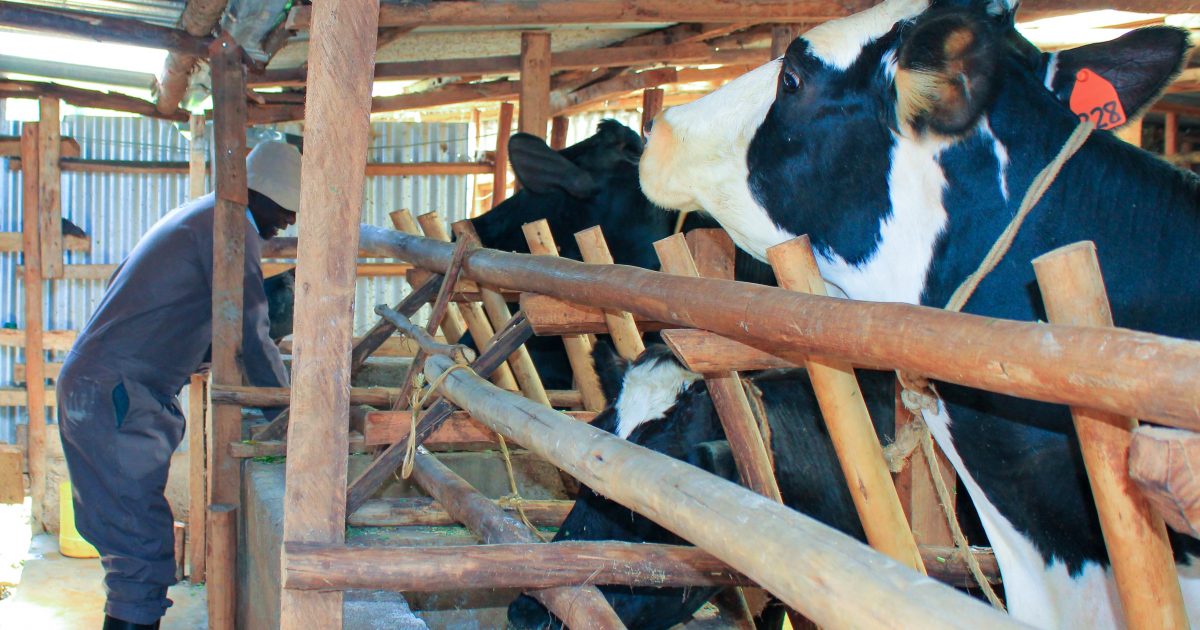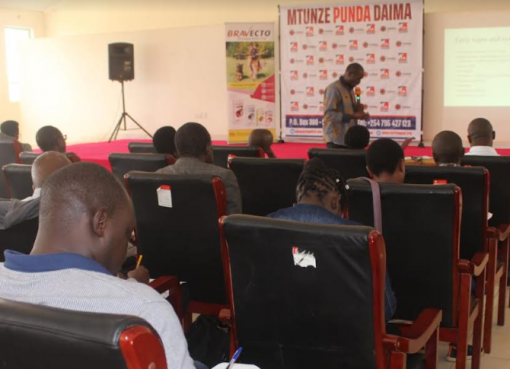Smallholder dairy farmers in Kisii County have embraced AI technology in breeding exotic cows under a zero-grazing production system to scale up supply of milk to meet its high demand in the region.
The farmers serve their main breeds; Friesian, Ayrshire, and Jersey with semen from bulls of superior quality using AI technique because they have a potential yield of 20 to 40 litres of milk per cow in a day compared to indigenous breeds.
A report by Tegemeo Institute of Agricultural Policy and Development, shows that milk from livestock is estimated at 5.2 billion litres annually, out of which cow milk accounts for 75 percent.
Milk is primarily produced under zero-grazing, semi-zero grazing, and open grazing by an estimated 1.8 million smallholder dairy farmers that depend on it for their livelihoods.
Ishmael Matena, a farmer from Riatwenya in Nyatieko ward, started his dairy farming in 1992 after he sold his goats and raised money to buy two local breed cows from Daraja mbili market in Kisii town.
He says he began dairy farming to get milk for home consumption but later on, added more cows which produced additional milk forcing him to venture into the milk business.
“I decided to shift from the local breed and I bought a Friesian and an Ayrshire after selling my first local cows together with their calves. I currently have ten dairy cows and four heifers, all got after serving the exotic breed using AI technology,” adds Matena.
Matena notes that he visited Kenya Agricultural and Livestock Research Organization (KARLO), to see how dairy farming was being done, especially the zero-grazing system, and was trained on various skills that he used to start a dairy farm at his homestead.
He also joined a group of farmers that visited Limuru in 2002, where an American had set up a dairy farm and they were trained on how to practice dairy farming and get maximum productivity.
“Every cow can produce milk. It all depends on how you feed it. We were told that if you spray your cows to protect them from pests, put cow mattresses for them to sleep on, and even turn on a radio for them to listen to, they will produce maximum milk because they will no longer have stress,” explains Matena.
He adds that his cows produce 70 to 90 litres of milk in a day when most of them are lactating but currently, he gets at least 40 litres of milk that he sells directly to consumers in Kisii town at Sh70 per litre.
With assistance from a farm manager, Matena majorly feeds his cows with napier grass that is chopped using a chaff cutter, grass and commercial dairy meal to meet the optimum nutrient requirements and boost milk production.
Using income from the sale of milk together with some cows at a cost of up to Sh120, 000, Matena has managed to educate his children up to university, upgraded his houses and other structures in his homestead, and even set up a hotel in Kisii town.
He points out that a dairy cow could get sick and die regardless of the efforts put to treat it as a major setback and for this reason, most farmers at the early stages of rearing exotic breeds give up on dairy farming.
Handson Nyakundi, who hails from the same locality, also established a dairy farm at his homestead in 2011. He sold his indigenous breed and currently has seven Friesian cows and four calves as a result of using AI technology.
When he began, Nyakundi says he would get at least 10 litres of milk per day from his local cows and give the produce to another dairy farmer who sold the milk in Kisii town at Sh45 per litre.
“I started to get milk of up to 20 litres in a day and the dairy farmer could not manage to sell it all and so, I decided to look for another farmer who could take all the milk and sell at Sh50 per litre,” he adds.
Currently, Nyakundi gets at least 50 litres of milk per day from his farm and some additional litres from other farmers which he takes to Kisii town to sell at a milk shop he opened.
He says he feeds his calves well for a period of 5 months before selling each between Sh30, 000 to Sh40, 000 and the big cows between Sh90, 000 to Sh100, 000 to get more money that he uses to pay his children’s school fees, buy food and manage other projects in his home.
Nyakundi decries impassable roads as a major challenge since he lives in a rural area saying it is difficult to transport his yields to the market during rainy seasons and that forces him to spend more.
Thomas Matoke and his brother Joel Machuki started their dairy farm three years ago in Nyabonge, Kisii County after visiting Nyakundi’s farm and acquiring knowledge on dairy farming.
Matoke says they raised capital and went to Kapkatet where they bought two dairy cows; a Friesian and a Jersey, which they served using AI and currently have fourteen dairy cows.
“We milk at most 300 litres of milk in a day from our cows and since we lack a stable market, we have contracted a dairy farmer who sells the milk at a cost ranging from Sh45 to Sh60 per litre depending on the market,” says Matoke.
He adds that they normally visit other dairy farms to learn more on structures, feeds and breeding among other dairy activities, and implement the same at their farm to ensure their target of rearing thirty dairy cows is reached.
Matoke notes that feeding the cows during the dry season and artificial insemination failure due to expired semen were their major challenges and urges other farmers not to give up when they faced the same since dairy farming has more benefits.
Embracing technology in the livestock sector, producing climate change resilient and high-yielding breeds are part of key effort smallholder dairy farmers are making to help the National Government achieve the Big 4 Agenda of food security.
By Augustine Mosioma





